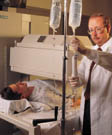 Searching
for new solutions So far, radioimmunotherapy researchers have successfully produced remissions in patients with intermediate or high-grade B-cell lymphomas. They are now working with patients with metastatic breast cancer, the most common cancer in women and the second leading cause of female cancer deaths, and with patients with prostate cancer, a usually slow-moving but pervasive male cancer. "These cancers make good study candidates because both are known to be highly reactive to external beam radiation, a common component of many cancer treatment protocols," said O'Donnell. The researchers are also working on a new protocol that combines radioimmunotherapy with concurrent chemotherapy. They hypothesize that because chemotherapy in standard cancer protocols increases the sensitivity of cancer cells to external beam radiation, it might also increase their sensitivity to the radiation delivered by the monoclonal antibodies. "We hope this approach might lead to greater success in killing the microscopic cancer cells that are so hard to eradicate," said O'Donnell. The results of radioimmuno- therapy among lymphoma patients are encouraging, but because its use in breast and prostate cancer patients is just beginning, these results are not yet available. "We try to give patients a cautious view because we don't know if it will make a difference for them. We want them to come into this experimental treatment with their eyes wide open," said O'Donnell, who is seeking more patients. "But we are glad to be able to offer them this option, and we find that these patients are a highly educated subpopulation who have learned a lot in the course of their illness. "They know they have a bad cancer, but many are very altruistic. They hope their par- ticipation will make the outlook for some future cancer patient better than theirs has been."
Home |
Table of Contents |
To our Readers |
Building on Basics UC Davis Health System | © 2000, 2001, 2002 UC Regents. All rights reserved. |
Radioimmuno- |

